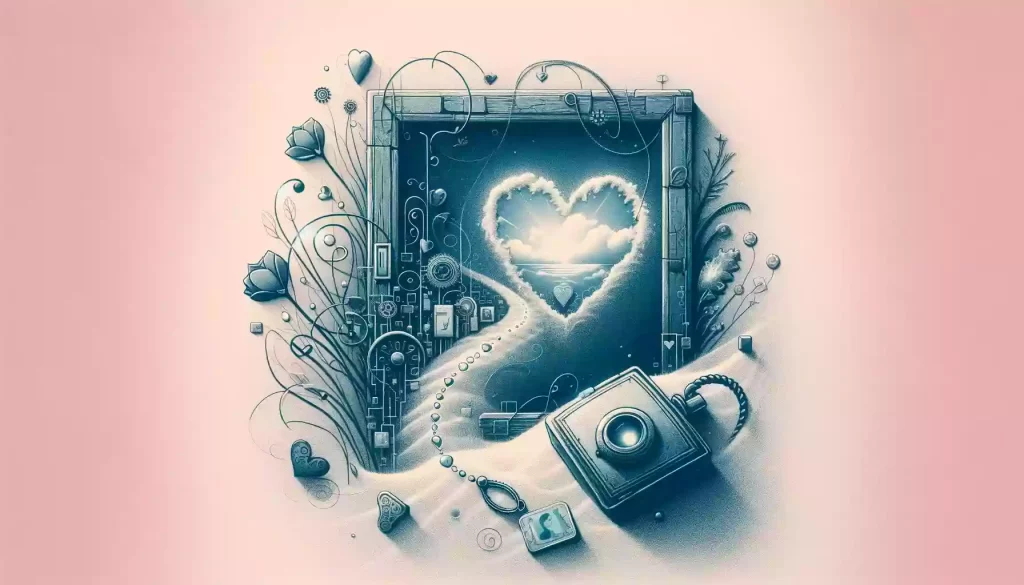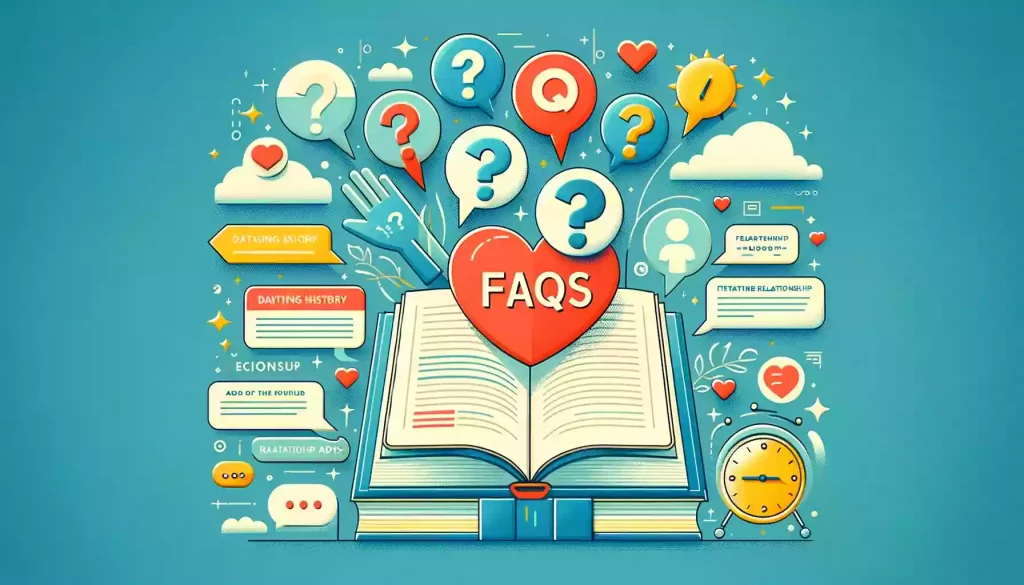Understanding Your Dating Patterns
When it comes to navigating the complex world of relationships, understanding your dating history is crucial. It's not just about who you dated or for how long; it's a window into your personal preferences, behaviors, and choices that have shaped your love life. This insight is invaluable in guiding you towards healthier, more fulfilling relationships in the future.
Examining your dating history involves looking at both the positive and negative aspects of your past relationships. What were the common traits among the people you chose to date? What patterns emerged in how those relationships progressed or ended? Understanding these patterns can help you make more informed choices in your future love life.
It's also essential to reflect on how your dating history has affected your self-image and expectations. Often, the way we view ourselves and what we expect from relationships is deeply influenced by our past experiences.
By delving into these aspects, we can gain a clearer understanding of our own needs and desires, setting the stage for healthier and more rewarding relationships.
Key Takeaways:
- Understanding dating patterns is key to healthier future relationships.
- Past relationships significantly influence personal preferences and behaviors in dating.
- Reflecting on dating history helps in setting realistic expectations and improving self-image.
- Learning from past experiences paves the way for more fulfilling relationships.
- Recognizing patterns can aid in avoiding repeated mistakes in love.
How Past Relationships Shape Your Future

Your dating history is more than a series of romantic encounters; it's a tapestry of experiences that contribute to your personal growth and future relationships. Every past relationship leaves an imprint, influencing your approach to love, trust, and communication in future connections.
These experiences, whether positive or negative, serve as lessons. Positive experiences may set a standard for what you seek in a partner, while negative experiences often teach what to avoid. This process of learning and adapting is crucial in shaping the type of relationships you'll form in the future.
Another aspect to consider is how past relationships impact your emotional resilience. Overcoming heartbreak or challenges strengthens your emotional fortitude, preparing you for future relationships. This resilience is key to navigating the ups and downs of love with a more balanced perspective.
Moreover, past relationships often reflect your evolving needs and preferences. What might have appealed to you in a partner years ago may no longer hold the same importance. Recognizing this evolution in your preferences is a significant step in understanding your journey towards a fulfilling love life.
It's also important to acknowledge the role of timing in how past relationships shape your future. Sometimes, a relationship may not work out simply because of timing, which is a valuable lesson in patience and understanding the importance of life circumstances in relationships.
Reflecting on past relationships can also help in identifying patterns, whether they be in choosing partners or in how you communicate and resolve conflicts. Recognizing these patterns is crucial for breaking any negative cycles and fostering healthier relationships going forward.
Your past relationships are a rich source of personal insight and growth. They help in sculpting a clearer vision of what you truly seek in a partner and in a relationship, guiding you towards a more fulfilling and loving future.
Decoding Emotional Baggage from Exes
Emotional baggage from past relationships is a common challenge many face in their dating journey. It's the accumulation of hurt, disappointment, mistrust, or unresolved feelings that one carries from previous relationships into new ones. Understanding and managing this emotional baggage is key to building healthy and happy future relationships.
One of the first steps in decoding this baggage is recognizing its presence. It often manifests as trust issues, fear of commitment, or projecting past experiences onto new partners. Awareness of these tendencies is the first step towards addressing them.
It's also vital to process and heal from past hurts. This might involve self-reflection, therapy, or open conversations with trusted friends or family. Healing is a personal journey and takes time, but it's essential for moving forward without the weight of past relationships holding you back.
Finally, learning to let go of the past and give new relationships a fair chance is crucial. This means not allowing past experiences to dictate your present and future happiness. It's about finding a balance between learning from the past and not letting it overshadow your current experiences and opportunities for love.
The Impact of First Loves on Current Dating Choices

First loves hold a unique place in our hearts and minds, often leaving a lasting impact on our subsequent dating choices. These early experiences of romance and attachment can shape our expectations, fears, and desires in future relationships.
The intensity of first loves can set a high emotional benchmark. The depth of feelings experienced during this formative period can create a template for what we seek in future relationships. This emotional blueprint often influences the type of people we are attracted to and the qualities we value in a partner.
Moreover, first loves can also leave behind unresolved feelings or what-if scenarios. These lingering thoughts can affect how we approach new relationships, sometimes leading us to seek similar qualities in new partners or, conversely, to avoid certain traits altogether.
It's also common for first loves to impact our vulnerability in relationships. The innocence and openness experienced in a first love might be hard to replicate in subsequent relationships, especially if the first experience ended in heartbreak.
Understanding the influence of first loves requires introspection. Reflecting on what was learned, both positive and negative, can provide valuable insights into current dating choices and relationship patterns.
While first loves are a significant part of our romantic history, recognizing their impact allows us to approach new relationships with a more grounded and mature perspective, valuing them for their own unique qualities and experiences.
Learning from Relationship Mistakes
Relationship mistakes, though often painful, are invaluable learning opportunities. Each misstep provides insights into what works and what doesn't in a relationship, helping to shape better future choices.
One common mistake is neglecting personal needs and boundaries. In the desire to make a relationship work, it's easy to compromise too much. Learning to maintain a balance between personal needs and those of a partner is crucial for a healthy relationship.
Communication breakdowns are another frequent error. Misunderstandings and assumptions can lead to conflicts. Understanding the importance of open, honest communication is key to preventing such issues in the future.
Ignoring red flags is also a typical mistake. Sometimes, in the excitement of a new relationship, warning signs can be overlooked. Learning to trust one's instincts and pay attention to red flags is vital for avoiding potentially unhealthy relationships.
Another lesson often learned the hard way is the importance of mutual respect and support in a relationship. Relationships that lack these fundamental elements are unlikely to be fulfilling or enduring.
Finally, understanding that it's okay to walk away from a relationship that isn't working is a crucial lesson. Not every relationship is meant to last, and recognizing this can lead to healthier and more satisfying relationships in the future.
The Role of Dating History in Identifying Red Flags

One of the most significant benefits of reflecting on your dating history is the ability to identify red flags in potential partners. These are warning signs that might indicate underlying issues, incompatibility, or potential problems in a relationship.
Patterns from past relationships often serve as indicators of what to watch out for. For instance, if you've repeatedly encountered partners who were unfaithful, you might become more attuned to signs of dishonesty or evasion in future relationships.
Understanding the nuances of red flags also involves recognizing personal triggers. Certain behaviors or traits might be particularly concerning for you based on past experiences, even if they may not be universally acknowledged as red flags.
It's important to differentiate between genuine red flags and personal insecurities or biases. While it's vital to be aware of warning signs, it's equally important to ensure that past traumas aren't clouding your judgment unfairly.
Another aspect to consider is the context in which these red flags appear. A single instance of a concerning behavior might not be indicative of a pattern, so it's crucial to observe if such behaviors are consistent and persistent.
Lastly, learning from dating history to identify red flags is about striking a balance. It's about being cautious and aware, without becoming overly suspicious or cynical. Maintaining this balance can help you navigate new relationships with wisdom and clarity.
Navigating Trust Issues in New Relationships
Trust issues are a common challenge in new relationships, especially for those with a history of betrayal or disappointment in past relationships. Building trust is a gradual process, and understanding how to navigate this terrain is crucial for the health of a new relationship.
Communication is key in addressing trust issues. Being open about your fears and concerns can help your partner understand your perspective and work with you to build a foundation of trust.
It's also important to give your new partner the benefit of the doubt. While being cautious is understandable, it's essential to avoid punishing your new partner for the mistakes of someone from your past.
Finally, self-reflection and possibly seeking professional help can be beneficial in overcoming trust issues. Understanding the root of these issues and working through them can lead to healthier and more trusting relationships in the future.
The Importance of Closure with Ex-Partners

Achieving closure with ex-partners is a critical step in moving on from past relationships. It involves resolving any lingering feelings or issues, allowing both parties to move forward with clarity and peace.
Closure can take various forms, depending on the nature of the relationship and its end. For some, a conversation may be needed to address unresolved issues. For others, it might be a personal process of acceptance and letting go.
One of the main benefits of closure is the ability to learn from the relationship. It allows you to reflect on what worked, what didn't, and how you can apply these lessons to future relationships.
It also helps in releasing emotional baggage. Holding onto anger, resentment, or sadness can hinder your emotional well-being and affect future relationships. Closure provides a way to release these emotions.
Moreover, achieving closure can prevent the past from intruding into new relationships. It ensures that unresolved feelings from a past relationship don't overshadow or negatively impact your current or future relationships.
It's important to note that closure doesn't always involve direct interaction with an ex-partner. Sometimes, it's a personal journey of understanding, acceptance, and forgiveness, which can be achieved independently.
In essence, seeking closure is about respecting your emotional health and preparing for a future where past relationships no longer hold a negative influence over your love life.
Transforming Past Heartbreaks into Strength
Heartbreak, while deeply painful, can be a powerful catalyst for personal growth and strength. Transforming the pain of a broken heart into resilience is a profound journey of self-discovery and empowerment.
The initial phase of dealing with heartbreak often involves acknowledging and expressing the pain. Suppressing emotions can prolong the healing process, so it's essential to allow yourself to grieve.
Reflecting on the relationship can provide valuable insights. What did the experience teach you about yourself, your needs, and your boundaries in relationships? Such reflections can turn painful memories into lessons for the future.
One of the key aspects of transforming heartbreak into strength is the realization of your own resilience. Surviving and moving beyond the pain shows your ability to overcome adversity and emerge stronger.
Rebuilding self-esteem is another crucial step. Heartbreak can take a toll on your self-worth, so engaging in activities that reinforce your confidence and self-love is essential.
Finally, embracing a positive outlook on future relationships is vital. Heartbreak doesn't signify the end of love in your life; it's a step towards a more mature and fulfilling love in the future.
FAQs on Dating History and Future Relationships

Q1: How much should I share about my dating history with a new partner?
A: Sharing your dating history should be based on comfort and relevance. It's important to be honest, but also consider what is appropriate to share and when. The focus should be on learning from past experiences rather than dwelling on the details.
Q2: Can past relationship patterns be changed?
A: Yes, past relationship patterns can definitely be changed. It requires self-awareness, a willingness to learn from past mistakes, and sometimes professional guidance. Recognizing unhealthy patterns is the first step towards change.
Q3: How do I know if I'm ready to date again after a breakup?
A: You're likely ready to date again when you feel emotionally healed, have a clear understanding of what went wrong in your previous relationship, and feel excited about meeting new people without being held back by the past.
Q4: How can I use my dating history to improve future relationships?
A: Reflect on your past relationships to understand your needs, preferences, and deal-breakers. Use these insights to make more informed choices in future relationships and to communicate your needs more effectively.
Q5: Is it important to discuss past heartbreaks with a new partner?
A: Discussing past heartbreaks can be important for building trust and understanding in a new relationship. However, it should be done thoughtfully and at a suitable time in the relationship.
Expert Tips for a Healthy Dating Life Post-Breakup
1. Take time to heal: Allow yourself time to grieve and understand what you've learned from your past relationship. Rushing into a new relationship without processing your emotions can lead to repeated patterns.
2. Rebuild your self-esteem: Focus on activities that make you feel good about yourself. Whether it's pursuing hobbies, spending time with friends, or personal development, building your self-esteem is crucial for a healthy dating life.
3. Set clear boundaries: Understanding your boundaries and what you will and will not tolerate in a relationship is key. This clarity helps in attracting partners who respect your limits and share similar values.
4. Communicate openly: Honesty and open communication are vital. Be clear about your intentions, feelings, and expectations in a new relationship, and encourage your partner to do the same.
5. Keep an open mind: Each new person you meet is different. Approach new relationships with an open mind, free from the biases of past experiences, while still being mindful of learned lessons.
How to Discuss Your Dating History with New Partners
Discussing your dating history with new partners can be a sensitive topic, but it's an important part of building trust and understanding in a relationship. The key is to approach the conversation with honesty and sensitivity.
Timing is crucial. It's usually best to wait until you have established a level of trust and comfort with your new partner. This conversation shouldn't be part of early dating, but rather when you're moving towards a more serious relationship.
Be honest but not overly detailed. Share the aspects of your dating history that you feel are important for your partner to know, such as what you've learned from past relationships or any significant experiences that have shaped you.
Lastly, be prepared to listen. This conversation should be a two-way street, where you are also open to hearing about your partner's past experiences. This mutual sharing can strengthen your connection and understanding of each other.
Creating a Positive Outlook on Love After Past Relationships
Creating a positive outlook on love after past relationships involves a shift in perspective and a conscious effort to embrace optimism. It's about believing in the possibility of love, despite past disappointments.
Focus on self-growth. Use your past experiences as opportunities to learn about yourself and what you truly want in a relationship. This self-awareness can guide you towards more fulfilling relationships in the future.
Practice gratitude for past relationships. Even if they didn't last, they likely taught you valuable lessons and contributed to your growth. Appreciating these lessons can help you move forward with a positive mindset.
Surround yourself with positive influences. Spend time with friends and family who support and uplift you. Positive relationships in other areas of your life can reinforce your belief in love and happiness.
Stay open to new experiences. Don't let fear of the past close you off to new opportunities. Remember, each new relationship is a chance to start fresh and create something beautiful.
Lastly, be patient with yourself. Healing from past relationships and rebuilding your outlook on love is a process. Give yourself the time and grace to heal and open up to love again.
Recommended Resources
- Data, A Love Story: How I Cracked the Online Dating Code to Meet My Match, Amy Webb, Dutton Adult, 2013
- Love, Inc.: Dating Apps, the Big White Wedding, and Chasing the Happily Neverafter, Laurie Essig, University of California Press, 2019
- The Science of Happily Ever After: What Really Matters in the Quest for Enduring Love, Ty Tashiro, Harlequin Nonfiction, 2014


Recommended Comments
There are no comments to display.
Create an account or sign in to comment
You need to be a member in order to leave a comment
Create an account
Sign up for a new account in our community. It's easy!
Register a new accountSign in
Already have an account? Sign in here.
Sign In Now